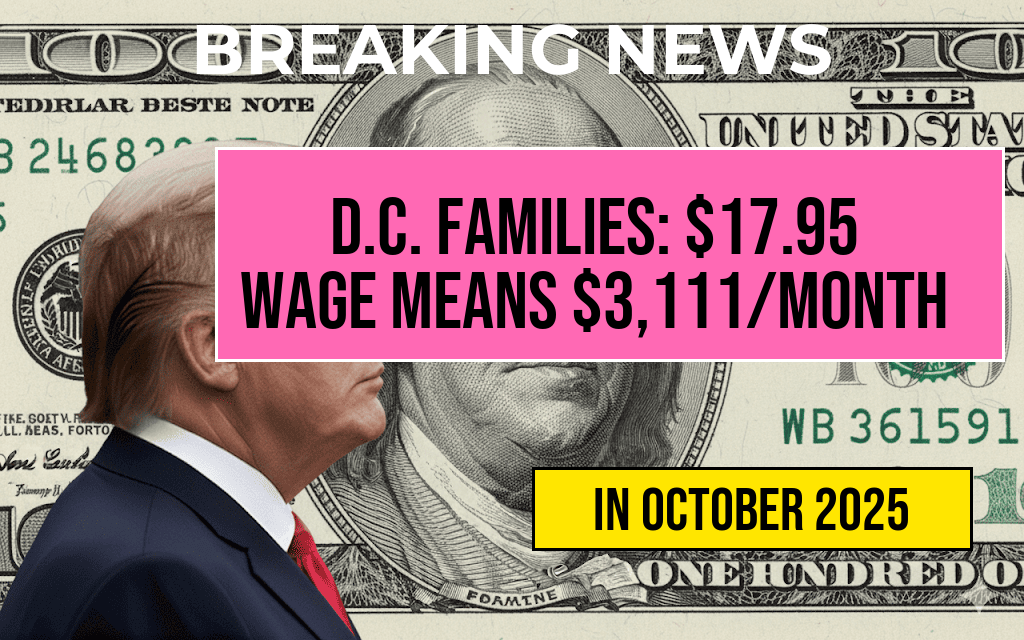DC Families Face Significant Income Challenges with a $17.95 Minimum Wage
For full-time workers in Washington, D.C., earning the current minimum wage of $17.95 per hour translates to a monthly pre-tax income of approximately $3,111. Based on a standard 40-hour workweek, this income reflects a gross annual earning of around $37,332. While this figure may seem substantial at first glance, it reveals the stark reality many families face when balancing living costs in the nation’s capital. Expenses such as housing, transportation, healthcare, and childcare often far surpass what a minimum wage income can comfortably support, prompting ongoing discussions about wage adequacy and economic disparities in the city.
Breaking Down the Earnings and Expenses
| Category | Amount |
|---|---|
| Gross Monthly Income (before taxes) | $3,111 |
| Estimated Taxes (federal, state, local, FICA) | Approx. $600 |
| Net Monthly Income (after taxes) | $2,511 |
| Average Monthly Rent for a One-Bedroom Apartment | $2,200 |
| Remaining Funds After Rent | $311 |
| Estimated Monthly Transportation Costs | $100–$150 |
| Estimated Monthly Food Expenses | $300–$400 |
| Other Essential Expenses (utilities, healthcare, childcare) | $300–$500 |
These estimates highlight a fundamental challenge: the majority of minimum wage workers in D.C. allocate most of their income toward housing, leaving limited funds for other necessities. With rent consuming roughly 70–80% of net income, many families struggle to cover additional living costs, often leading to difficult choices or reliance on assistance programs.
Housing Costs Outpace Earnings
Housing affordability remains a primary concern for low-wage earners in Washington, D.C. The city’s housing market is among the most expensive in the country, with the median rent for a one-bedroom apartment approaching $2,200 per month. This figure exceeds the net income of a full-time minimum wage worker by nearly $200, forcing many to seek roommates, move to less desirable neighborhoods, or face housing instability.
Implications for Families and Policy
The gap between earnings and living costs has significant implications for families in D.C. Many workers earning the minimum wage find themselves unable to afford basic needs without supplementary support. This economic pressure can impact health, educational opportunities, and overall quality of life.
Local policymakers have debated increasing the minimum wage further, with some advocating for a higher threshold to better align income with the cost of living. However, opponents argue that wage hikes could lead to reduced employment opportunities or increased automation, especially for entry-level positions. The ongoing dialogue reflects broader national debates over minimum wage policies and economic equity.
Broader Context and Resources
The minimum wage in D.C. is periodically adjusted by local legislation to keep pace with inflation and economic conditions. As of 2023, the wage remains among the highest in the country, yet the rising living expenses continue to outstrip income gains for many residents.
- Wikipedia: Washington, D.C. Minimum Wage
- Forbes: Most Expensive Cities in the U.S.
- District of Columbia Government
As debates continue over appropriate wage levels, residents, advocates, and policymakers are grappling with how to ensure economic stability for working families amid the city’s vibrant but costly landscape. Addressing the disparity between income and living costs remains a crucial step toward fostering a more equitable economic environment in the nation’s capital.
Frequently Asked Questions
What is the minimum wage for full-time workers in D.C.?
The minimum wage in Washington D.C. for full-time workers is $17.95 per hour.
How much does a full-time worker earn monthly before taxes at this wage?
A full-time worker earning $17.95 per hour makes approximately $3,111 per month before taxes.
Does this wage meet the living standards for families in D.C.?
While the $17.95 hourly wage provides a baseline, many families may find it challenging to cover all living expenses, highlighting ongoing discussions about wage adequacy.
How are taxes affecting the take-home pay of workers earning this wage?
Taxes will reduce the monthly income from $3,111, so the actual amount received will be less after federal and local taxes are deducted.
Are there plans to increase the minimum wage further in D.C.?
There have been ongoing discussions and proposals to raise the minimum wage further to support families and workers, but specific future increases depend on policy decisions.









